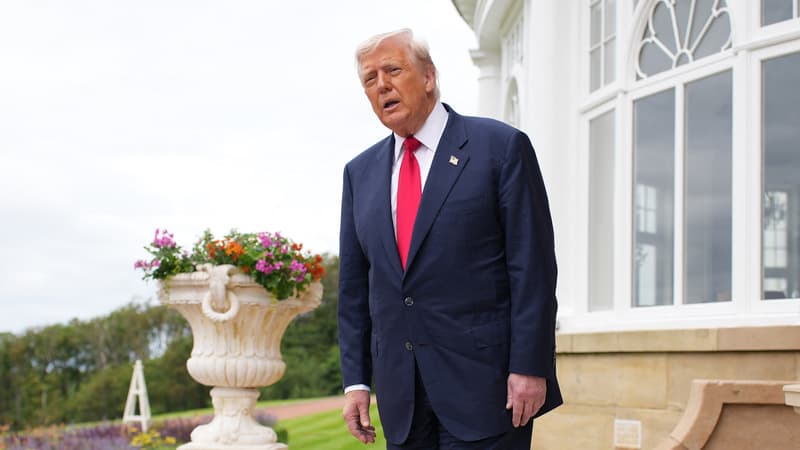The list is getting longer. After Japan and the Philippines on Tuesday and the European Union on Sunday, it is the turn of South Korea to conclude a commercial agreement with US President Donald Trump. On Wednesday, July 30, Seoul and Washington agreed to customs tasks up to 15% in Korean products exported to the United States.
Planned taxes are often higher than the 10% floor level applied since April by the United States to most products. And these agreements, whose details are often not negotiated, have also been obtained at the price of the main concessions by the directed countries.
15% for South Korea
If an agreement concluded well on Wednesday between the United States and South Korea, it is because, like the European Union and other countries, Seoul agreed to bend to the counterparts in favor of Washington.
In fact, Seoul has pledged to invest $ 350 billion in the United States, with in particular the purchase “per 100 billion dollars” of liquefied natural gas (LNG) “or other energy sources”. South Korea escapes the initial threat of 25% of the surcharge.
15% for the European Union
With the agreement announced on Sunday night, European products will be taxed by 15%, instead of 30% soft for Donald Trump if no agreement had been found on August 1. In return, the EU has been involved at $ 750 billion in energy purchases and 600 million additional investments in the United States.
The United States and the EU will also eliminate their customs duties for certain “strategic products”, including aeronautical equipment, “certain chemical products”, as well as “certain agricultural products and critical raw materials,” according to the European Commission, without detailing more.
Europeans expected in particular to be able to tear a more favorable treatment for wines and spirits. Donald Trump in any case indicated Sunday that the pharmaceutical sector would not benefit from special treatment.
15% also for Japan
According to the agreement announced on Tuesday by Donald Trump, Japanese products imported to the United States will be recharged to 15%, below 25% of which the archipelago was threatened.
Tokyo in particular obtained total customs tasks of 15% for its crucial automotive sector, which represented almost 30% of exports last year to the United States.
50% surcharge in Japanese steel and aluminum exports continues to apply.
The agreement has Japanese investment for “$ 550 billion” in American soil, and “90% of the profits generated will remain in the United States,” according to a memorandum published by the White House.
Japan will also buy $ 8 billion in American products (corn, soy, fertilizer, bioethanol …), adds this document. Tokyo undertakes to buy American airplanes, “especially 100 Boeing”, muscle their purchases from the US defense industry and to “increase restrictions” that, according to Washington, are the access of US cars to the Japanese market.
19% for the Philippines and Indonesia
According to the agreement also announced on Tuesday, the Philippines obtained a small reduction in customs tasks that will be applied in their products at the entrance of the United States. They were established in 19%, against 20% announced in early July.
Customs duties also amounted to 19% for Indonesia, according to the framework agreement in mid -July. It is far from the threat of 32% for brandy time.
According to Washington, Yakarta agreed to provide almost all American customs tasks and recognize US standards for vehicles or pharmaceutical products. Indonesia must also return to the planned taxes of the digital economy and has pledged to raise restrictions on critical mineral exports.
20% for Vietnam
Vietnam was agreed at the beginning of July with the United States, its main export market for textiles and private shoes, with a 20% surcharge, and not 46% as initially scheduled.
However, the agreement establishes duplicate the 40% rate for products designed in other places and only travel through Vietnam through the qualified transhipment methods of SO. But no details were given about what would define such products.
The agreement establishes zero taxes for US products exported to Vietnam.
50% for Brazil
Brazil is expected to increase 50% of surcharge in retaliation for legal procedures involved against its former president Jair Bolsonaro, accused of an attempted coup after his defeat in the presidential elections of 2022, a “witch hunt” according to his ally Donald Trump.
The White House tenant signed a decree in this regard on Wednesday, as of August 6.
However, exceptions will be made for airplanes, orange juice and pulp, Brazil nuts and certain iron, steel or aluminum products. Washington accuses the judge of the Supreme Court Alejandro de Moraes of “arbitrary arrests” and breach of “freedom of expression.”
The Treasury believes that the judge took advantage of his position to “point to political opponents, including former President Jair Bolsonaro, journalists, US social networks and other US and international companies.”
10% on average for the United Kingdom
In May, London and Washington had completed an agreement that provided the reduction of 27.5% to 10% of customs tasks in cars (up to 100,000 vehicles per year), as well as an exemption from rights to the aerospace sector.
London is still negotiating exemptions for steel and aluminum, provided for in the agreement announced in May, against 25% currently.
In return, the United Kingdom has agreed to open its American beef or beef market further, which arouses concerns in the country. The rest of the British manufactured products are still subject to 10%of floor rights.
Source: BFM TV


